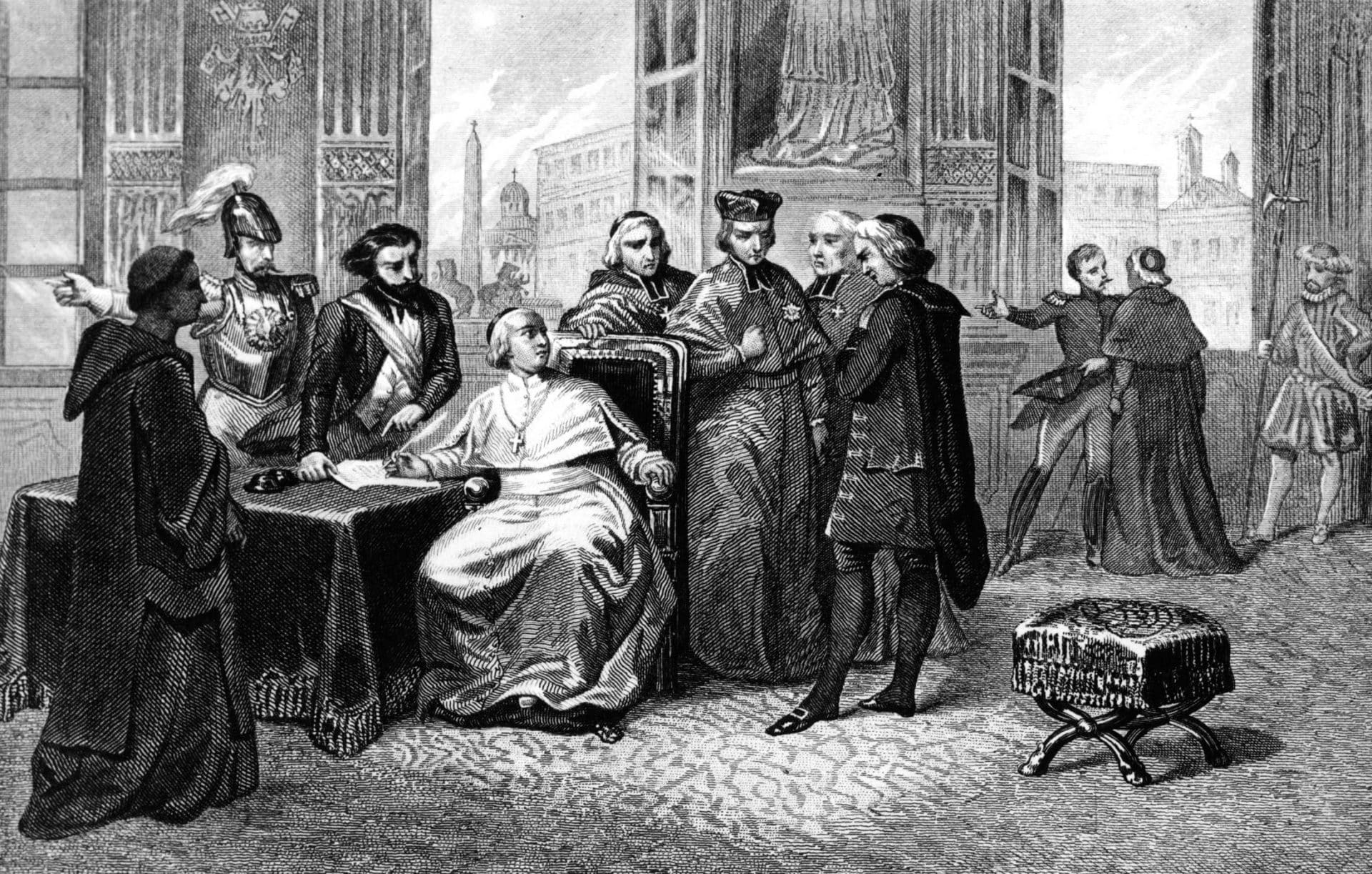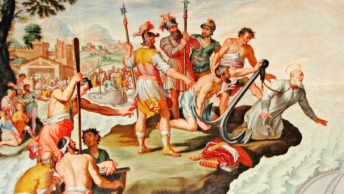The longest-serving Pope in the Church’s almost 2000-year history was Pius IX, who reigned for almost 32 years, from 1846-1878. It was he who solemnly defined the dogma of the Immaculate Conception: namely, that Mary was conceived in her mother’s womb free from any taint of original sin. Pius IX also approved the request of the American bishops that Our Lady of the Immaculate Conception be named our national patroness, and he created almost fifty current dioceses in the United States. As Pope, Pius had a reputation of being very strict when it came to defending Church teaching and moral standards, but he was personally known for a warm, kind, and charming personality. Pius IX was known for his holiness, and in fact was given the title Blessed—the final step before being canonized a saint—in the year 2000, during the papacy of St. John Paul II.
On one occasion Pius IX was being driven in his carriage in Rome when he noticed an elderly man lying on the ground, unconscious. He ordered the carriage to stop, and then personally went over to the man, around whom several bystanders were gathering. When the Pope asked them how the man had become unconscious, someone answered that the reason was unknown, but it didn’t really matter—for the man was only a Jew. Pius was angry at this prejudiced and uncharitable remark, and ordered that the man be placed in his papal carriage, driven to his home, and carried inside; then, when the Pope returned to the Vatican, he sent his own official physician to care for the ill man (Rev. Francis Spirago, Anecdotes and Examples from the Catechism, p. 135). If we are to be true followers of Jesus, we don’t get to pick and choose the objects of our compassion; Our Lord insists we show a willingness to serve every needy or suffering person we meet.
Sometimes people like to make religion abstract or theoretical as a way of keeping it from becoming too uncomfortable or challenging. However, this is not an option for those who genuinely wish to know and love God. In the Book of Deuteronomy (30:10-14), Moses tells the people that God’s commandments are not mysterious and remote, but very practical and down-to-earth. Following upon this, in his Letter to the Colossians (1:15-20), St. Paul insists that while God may be invisible, we can still know and love Him intimately in the person of His Son, Jesus Christ, while living out our faith as members of His body, the Church. This, of course, requires that we try to imitate Jesus in His mercy and compassion. As Our Lord explains in the Gospel of Luke (10:25-37), eternal life is offered to those who love God with all their hearts and love their neighbor as themselves. A scholar of the law wanted to complicate matters, so Jesus told one of His most famous parables—one with an unmistakable lesson or message. The Samaritan wasn’t as knowledgeable in religion as the temple priest or Levite, but in his kindness and concern, he alone showed what true religion is all about.
Blessed Pope Pius IX gives yet another example of true Catholicism in action. One afternoon he was walking alone through the Vatican galleries, and came upon a young Englishman looking in wonder upon a painting by the great artist Raphael. The Holy Father addressed him, saying, “I presume you are an artist, my son?” The young man answered, “Yes, Your Holiness, and I came to study painting at Rome’s world-famous Academy—but I am unable to afford the fee, and so must return to England.” When the Pope then offered to pay the tuition out of his own pocket, the shocked Englishman exclaimed, “But, Your Holiness, I am a Protestant.” Pius IX smiled and said, “That does not alter your case; you shall not be denied admission on that account” (Spirago, p. 134). One of the fiercest defenders of Catholicism in human history—a Pope who formally defined papal infallibility, who vigorously condemned religious error, and who uncompromisingly insisted that the Catholic Church alone has the truths necessary for salvation—showed great kindness, in a very personal and practical way, to a Jew, and to a Protestant. Blessed Pius IX understood that religious differences are never an excuse for refusing to help someone in need—and this is a lesson Jesus wants you and me always to take to heart.
Every day we are given opportunities to practice compassion by doing favors for other people—perhaps as simple as opening a door for someone or letting another driver pull out ahead of us into heavy traffic, or as important as calling 911 when we witness an accident, rendering first aid, and then staying with the accident victim until help arrives. Giving money to charity, consoling a grieving person, pretending not to notice someone’s embarrassing mistake, speaking kindly to anyone who seems lonely or confused, lending a helping hand without being asked, or otherwise demonstrating a willingness to get involved for the benefit of other people, including strangers, are all ways of following Jesus and of serving others in His Name—and each time we do this, we not only come closer to God, but also make it easier for persons of no religion to believe in His Fatherly care for them.
In order to become a priest, a man has to attend the seminary about nine years and study theology and many other things; in order to become a permanent deacon, a man has to take similar courses for a good many years. In order to become a Scripture scholar, a person has to first learn German, French, Hebrew, and at least one other ancient language, in addition to learning all about the Bible itself; in order to become a certified theologian, he or she must study for many years, write and defend a thesis, and undergo an intense examination, and then spend the rest of his or her life in ongoing study. However, none of these things are necessary for those who simply wish to know Jesus, and understand and live by His teachings. It doesn’t take a degree in theology or Sacred Scripture to realize that, in the end, it’s all about love. If we love God with all our hearts, putting Him at the center of our lives, and if we love our neighbor as ourselves, showing this by Christian charity whenever we have the chance, we have the assurance of eternal life—and there is nothing more important, valuable, or blessed than this.








